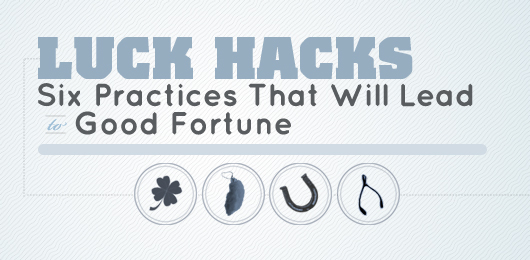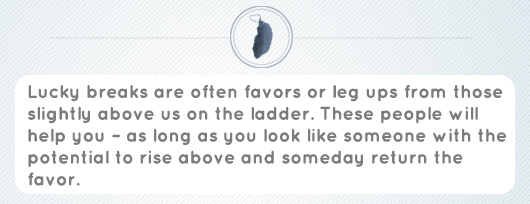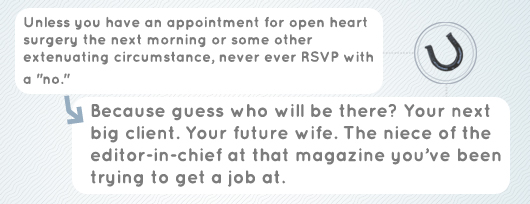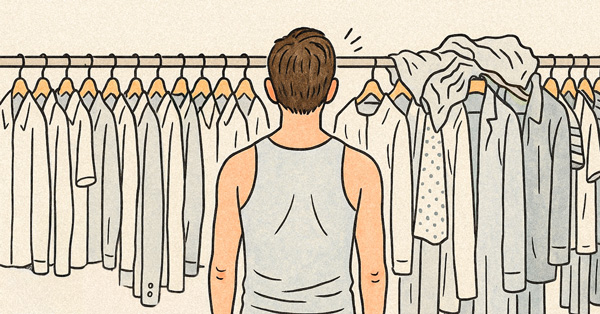That big opportunity with that company you’ve always wanted to work for. A date with that girl from the library who you’ve been eyeing for the past year. That invitation to go to the game with your friend who had two extra front row tickets. Boons like these can easily be called lucky breaks. But whatever your good fortune brings, don’t chalk it up to chance. Believe it or not, you earned all of these seemingly random blessings. How? Thomas Jefferson (allegedly) said it best: “I’m a great believer in luck, and I find the harder I work the more I have of it.”
Jefferson was being somewhat tongue-in-cheek with that comment, but it raises an interesting question: Which successes do we attribute to hard work and which ones to dumb luck? In answer to that question Richard Wiseman, professor of psychology and author of The Luck Factor, would explain that there is no such thing as “dumb luck.” Luck, he says, is distinct from chance because it is something that we build through our actions. In an interview with FastCompany.com, he stated:
Chance events are like winning the lottery. They're events over which we have no control, other than buying a ticket. They don't consistently happen to the same person. They may be formative events in people's lives, but they're not frequent. When people say that they consistently experience good fortune, I think that, by definition, it has to be because of something they are doing.
So what is this “something” you can do to increase your luck? After nearly a decade of study, Wiseman distilled four principles that contribute to a lucky existence:
(1) Maximize Chance Opportunities
(2) Listen to Your Lucky Hunches
(3) Expect Good Fortune and
(4) Turn Bad Luck Into Good.
Of course, these sound somewhat vague and, in the case of the last two, a bit new-age-y. But when you get into the specifics of increasing your luck, things start to make sense. Wiseman explains:
One way is to be open to new experiences. Unlucky people are stuck in routines. When they see something new, they want no part of it. Lucky people always want something new.
They're prepared to take risks and relaxed enough to see the opportunities in the first place.
Being lucky, according to Wiseman, is mostly about creating opportunities and having the confidence to take them. He doesn't go as far as to mention zen or any other enlightened states of mind, but he does have a point: being lucky has more to do with being open to opportunities than it does with preferential treatment from the universe.
In this way, luck is somewhat of a self-fulfilling prophecy: those who feel lucky seem to have better luck, simply by virtue of their being open to new experiences that may lead to good fortune. So what can a guy who’s looking for a new job, a new outlet for his creativity or a new female companion do to boost his luckiness? Why not try a few of Primer’s proven luck hacks:
Keep a Luck Diary
In his appearance on Wiretap with Jonathan Goldstein, Wiseman prescribed a “luck diary” in order to help unlucky folks turn around their misfortune. The idea is that unluckiness, too, is a self-fulfilling prophecy. People who feel like the cards are stacked against them are less likely to take the necessary risks that will open windows of opportunity. A luck diary puts you in the mindset to break the cycle of misfortune.
For the very pessimistic, it can be difficult to find something to feel lucky about every day – but that’s okay. You can start small. On day one, maybe you’ll consider it lucky that you got the last cannoli at the bakery. The next day maybe you’ll get lucky by getting a seat on the early bus, rather than having to wait 30 minutes to stand on the next one. The day after that, you can count yourself lucky for being the one to hold the elevator door open for the president of your company, who now knows your name and face. A month from now, you'll find yourself in the lucky position of being top of mind when it comes to promotions.
Going through this diary after a week or so, you’ll begin to notice a more fortunate portrait of yourself being painted. Life will seem a bit more just and you’ll begin feeling better about yourself, more optimistic. You’ll feel luckier, and will feel more open to taking on new risks, exploring new opportunities and you’ll be more pleasant to be around in general. Which leads to the next point:
Quit Complaining
As mentioned above, optimistic, lucky people simply make better company than the dreary folk. Think of the opposite: someone who complains that everything bad that happens to them and that they keep getting screwed or slighted. After hearing someone complain about everyone and everything long enough, most people will logically conclude that there is only one constant in all the sob stories: the unlucky person. Whether it’s fair or not, people tend to avoid the “unhappy and unlucky.” In fact, doing so is the 10th of The 48 Laws of Power, as discussed by Robert Green and Joost Elffers in the book of the same name.
Per the rule:
You can die from someone else’s misery – emotional states are as infectious as disease.
You may feel you are helping the drowning man but you are only precipitating your own disaster. The unfortunate sometimes draw misfortune on themselves; they will also draw it on you. Associate with the happy and fortunate instead.
Whether they do so consciously or not, many people subscribe to this notion. We are all, in a sense, drowning in the world. And while there are some saints among us who will throw a line to anyone who seems to be flailing, for the most part, people tend to help those who seem capable of staying afloat on their own once they get back on their feet.
So remember: Present yourself as someone who is worthy of assistance. We can’t make it alone in this world. Lucky breaks are often favors or leg ups from those slightly above us on the ladder. These people will help you – as long as you look like someone with the potential to rise above and someday return the favor.
Be Persistent
To the unlucky, failure is the bread and butter of his or her existence. But the rest of us know that failure is actually a vital ingredient for success. As Matt Heaton, president of BlueHost.com, calculates it:
Failure + Persistence = Success
Look at it this way: Say you have a sales pitch that is as good as it can get. You’ve got your pacing and handshake honed to perfection. But still, simply by nature of the market, only 1 out of 20 investors will say “yes” to your proposal. A person who considers himself unlucky gives up after hearing “no” ten or twelve times, decides that his idea is worthless and goes back to his day job. The persistent one keeps going, keeps pitching and finally, after he’s talked to 100 investors he gets 5 callbacks. It seems like his lucky break – but really, it’s all thanks to persistence.
Says Heaton: “Every time we fail we learn something – EVERY TIME. If you take that knowledge and use it to try again then success is inevitable. It might not happen the second time, or the third time, but it will happen.”
What does it take to be persistent? It takes someone who believes in their eventual success. Someone who remains optimistic. Someone who has already mastered the first two hacks in this article.
Go to Parties
One of the worst common excuses for declining an invitation to a party or social event is, “Well, I don’t know anyone.” But meeting new people is precisely the point of attending a party. Unless you have an appointment for open heart surgery the next morning or some other extenuating circumstance, never ever RSVP with a “no.” Because guess who will be there? Your next big client. Your future wife. The niece of the editor-in-chief at that magazine you’ve been trying to get a job at.
Here’s how the conversation might go:
“Oh, hey, my name’s Jeff. I used to work with Jerry back at Publisher, Co.”
“Oh yeah? What do you do?”
“I’m a graphic designer.”
“Wow, that’s great. I was looking for someone to do my company’s logo…”
And if that doesn’t happen right off the bat, you may meet someone who knows someone who can introduce you to the right people somewhere down the road. You can sit at home and Facebook stalk people all day long or send them unsolicited LinkedIn messages – but you’ll never have as much success as meeting them in the flesh.
Talk to People
Networking doesn’t have to end once the party has died. In fact, don’t even think of it as networking. Just think of it as reaching out to your fellow human beings. Make eye contact on the bus. Say “Hi.” Ask a co-worker how his weekend went. Call your mom. Find out what it is, exactly, your cousin does for a living. If nothing else, it’ll make you feel better. It may even help you live longer, according to gerontologist Thomas Glass, who found in his study that “social engagement was as strong as anything we found in determining longevity. It was stronger than things like blood pressure, cholesterol, or other measures of health.”
Glass’s study should be particularly interesting to men – according to their results, men who reported more social relationships – such as going to movies, church meetings, trips with friends and relatives or classes – were “significantly less likely to die” during the study period. Aside from reducing stress and ensuring that you have someone to turn to when you need a favor, having a strong social network can be highly beneficial to your luck. By showing an interest in others, they’ll likely return in kind. Once they know what you do and what your aspirations are, they’ll be far more likely to mention your name if they bump into someone who may be able to help you.
It’s like luck by proxy. The larger your network is – whether it’s social or professional – the more associates you have in the field with your interest in mind. So, reach out and talk to someone. It may be more rewarding than you expect.
Chill Out, Be Open
Above all, the most important ingredient to a lucky life is to be open and explore. This is somewhat counterintuitive to most models of success, which tell us to keep our eyes on the prize, remain focused and block out all distractions. But part of being lucky is finding good fortune in unexpected places. As Wiseman explains, if you go to a party determined to meet the love of your life, you may ignore the person who could’ve helped you with your career.
Instead, he advises that you adopt a “relaxed attitude to life.” People who become obsessed with one goal or one apparent roadblock become frustrated, resentful and close themselves off from the world, and ultimately, opportunity. So chill out. Stop worrying and let luck come to you. But make sure you answer when opportunity comes knocking.



















